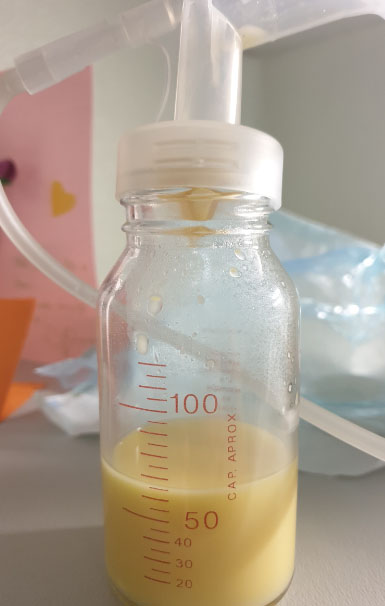Colostrum "Liquid Gold" – Your Baby’s First Breastfeed

During your transition to motherhood, your body starts producing immunity-boosting, nutrient-packed superfood, which is the perfect preparation for the newborn baby’s digestive system. It's not magic. It's colostrum!
What Is Colostrum?
Colostrum is a thick yellowish substance released through the ductal networks of your breasts and is the first stage of breast milk production. Colostrum is also referred to as "liquid gold" as it plays a vital role in building your baby's immune system. It is the first milk your newborn baby will receive during the first breastfeed. It’s also important to be reassured that colostrum is low in volume, and rich in nutrients. If you would like to learn more about how to get your breastfeeding journey off to the best possible start, download this free guide, which includes some valuable tips for breastfeeding.
Nutrient Content of Breastmilk
Colostrum is essential for the newborn baby as it helps build their immune system. Its rich golden colour and valuable immune properties make it an incredible superfood for babies. Besides nutrients, colostrum is packed with antibodies to provide an excellent boost of protection
Difference Between Colostrum and Breast Milk
Over the few days of breastfeeding, your breast milk volume gradually increases, slowly transitioning from the thick, rich colostrum to breast milk for the rest of your breastfeeding journey. However, small amounts of colostrum may remain in your breast milk for up to a few weeks. Below are some differences between colostrum and your breast milk:
- Colostrum is thicker and more yellow than breast milk.
- Colostrum has twice as much protein as compared to breast milk.
- Colostrum has four times as much zinc as compared to breast milk.
- Colostrum is filled with immunoglobulins that boost a baby's immune system and protect it from infections.
It is important to know that breast milk has different stages –
In the early stage, your breasts produce colostrum. It is the first milk produced by your body, and is the perfect preparation for your baby’s gut.
The next stage is the transitional milk, which gradually increases over the first 72 - 96 hours after the birth of your baby.
At around 3 weeks, your breast milk production will begin to regulate, depending on the unique circumstances surrounding you and your baby.
Benefits of Colostrum
Skin-to-skin contact with your baby immediately after birth is encouraged, awakening the instinctive skills of the newborn to survive.
If you are well and your baby’s Apgar Score is 7 or above, your baby belongs in your arms. Being with you will encourage the neurosensory skills of the newborn to breastfeed.
Colostrum has so many benefits, such as:
- It's your baby's first meal: It’s the perfect preparation for your newborn baby’s gut.
- It's perfect for tiny meals: Newborns have tiny stomachs. Colostrum is perfect as it is low in volume and rich in nutrients.
- It strengthens the baby's immunity: Colostrum builds your baby's immune system as it contains immunoglobulins, significantly offering protection from illness.
- It helps establish a healthy digestive system: It coats the intestines of a newborn, which helps keep harmful bacteria from being absorbed.
Wrapping Up!
The importance of colostrum should not be underestimated and is a vital substance for your newborn. Colostrum develops during pregnancy in preparation for the birth of your newborn baby. In some circumstances, some women choose to express colostrum, late in pregnancy, where there may be an increased risk of mother baby separation.
If you would like to learn more about colostrum, breastfeeding, and how to reduce the risk of common complications, The Thompson Method Breastfeeding Program can help. By empowering yourself with knowledge during pregnancy, you can increase your confidence to make informed decisions when it matters most. The Thompson Method team will guide you throughout your breastfeeding journey with the breastfeeding education classes.
Be empowered. Be informed. Be in control.





